Matt Rees's Blog - Posts Tagged "tour"
This is the life, Part 1: Germany
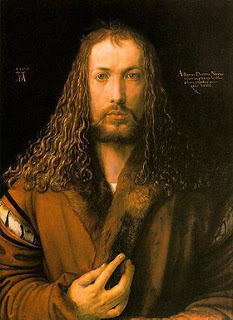
You’ll find a lot of writers’ blogs complaining about book tours. Not here. When I find one of my publishers around the world is happy to present me to hundreds of people who want to hear me talk about myself in fascinating places, I sign up right away.
That’s how I found myself in the Alte Pinakothek in Munich with very squeaky shoes.
More on that later…. I spent two weeks in March traveling Germany to promote the translation of my second Palestinian detective novel “A Grave in Gaza,” which is published there by C.H. Beck Verlag as “Ein Grab in Gaza”. It’s a family-owned publisher in business since the 1700s in Munich, run by a charming, shy man named Wolfgang Beck. In a world of megapublishers, there’s something wonderfully intimate about Beck’s office in the Schwabing district of Munich.
I began my tour at Lehmkuhl, a bookshop in Munich. The name means “Mudhole” in German and no one was able to offer an explanation for why anybody had chosen it. But there was a big crowd and a reading by myself and a local German actor. Unlike in other countries, where the audience gets fidgety the moment an author begins to read, Germans will happily listen to three chapters – including one read in English. It makes for long readings. Once you add in questions and banter and signing, they’re at least 90 minutes.
I had a day off in Munich after that and went to the Alte Pinakothek, where I disturbed the peace of the beautiful, airy galleries with a particularly squeaky pair of shoes. Entire school groups turned to see what the disturbance was… I wanted to see the famous self-portrait by Albrecht Duerer. In that portrait, the books all describe Duerer as gazing directly at the viewer, and that’s how it looks in photographs. Interestingly when you stand in front of the painting, it’s clear that he’s actually looking right through you, as though he were staring into some visionary future, focused absolutely on his art.
Or maybe he just couldn’t look me in the eye because of my squeaky shoes.
Thence to the enormous Leipzig Book Fair, held in a series of massive halls outside the historic town in eastern Germany. It’s lovely to see so many readers wandering the stalls, though anyone under the age of 26 appeared to be dressed as a Japanese cartoon character. My reading was hosted by Klaus Modick, a prominent German author who’s also my translator. At dinner in the old quarter of Leipzig in the Zum Arabischen Coffe Baum restaurant, Klaus and I had a long talk about the job of the translator. It was fascinating to hear the kinds of language choices a translator has to make. It’s notable, too, that even though I’ve been translated into 22 languages, Klaus is the only translator who sent me any questions about my original text. (My Danish translator, Jan Hansen, says that’s because I write such clear prose, there’s nothing to clarify. How do you say “You’re too kind” in Danish?)
Klaus also introduced me to “quark,” which is some kind of curd. It turns out Germans are obsessed with it the way Brits love Marmite.
Late that night there was a big publishers’ party in an old storage space beneath the medieval bastions of the city. The band: four German girls doing ABBA songs. Lots of happy German people. Very unhip, very nerdy. Really great!
Also at Leipzig I had coffee at the next table to Gunther Grass. He’s shorter than you’d expect…
How’s that for literary insight?
I went on to the Ruesselsheim area. South of Frankfurt, this is where Opel cars are manufactured – for the time being. Opel’s owned by GM and people are worried it’ll all be gone soon. In a town of 60,000, you can imagine what would happen if the 25,000 jobs at Opel disappeared.
The bookshop in Ruesselsheim is run by Hans-Juergen Jansen and his wife Monika, a charming pair who’ve created quite a cultural scene in this industrial town. So successful, in fact, that my first reading in the area inaugurated the opening of their new bookshop in nearby Gustavsburg. Imagine that: a new independent bookstore. There’s still hope for the world in these dark times, eh?
I also had an excellent pork dish at a restaurant overlooking the fast-flowing River Main in Ruesselsheim. They call the region “Rhine-Main” because of the confluence of the two great rivers. I dubbed the dish “Rhine-Main-Schwein,” and I think it might catch on….
I continued through Marburg, a historic university town on a mountain in the very center of Germany, where I spoke at the Roter Stern bookshop. (That means “Red Star,” and it started out as a communist collective in the 1960s. Nowadays, it’s still a collective, though no longer communist. At least I’m not naming names.)
The final pleasure of the trip was my stop at Schloss Elmau in the Bavarian Alps near Garmisch-Partenkirchen. It’s a gorgeous spa with a heated outdoor infinity pool on the roof. With my eyes on the snowy mountains all around, I swam a few laps with a big smile on my face.
A room at Elmau is 550 Euros a night. The delightful lady from Beck who accompanied me around Germany, Miriam Froitzheim, declared that she wanted to return to Elmau for her honeymoon. Men of Germany, Achtung!: you get an intelligent, beautiful wife AND a few nights at the most lovely hotel you’ll ever experience. Sounds like a deal. Macht schnell!
My reading at Elmau was organized by the wonderful Frau Ingeborg Praeger, who runs the extensive bookshop there. Frau Praeger spends about 40 days at Elmau in between her “outs” at her apartment in Munich. She helps put together the nightly cultural events at the spa – readings and musical performances mostly. When I was there Junot Diaz had just cancelled his appearance because he couldn’t be bothered to come from Cologne all the way up into the mountains to the spa. Which just shows you can win a Pulitzer and still not know which side your bread is buttered (as we say in Britain).
At Leipzig I had met Denis Scheck, a prominent literary critic on German tv and radio. He hosted my reading at Elmau and managed to ask questions no one else had asked, while also translating a summary of my answers into German without notes. At dinner, Herr Scheck proved himself to be quite the bon vivant. He’s writing a book about German wines. Did you know there’s no difference in taste between red and white wine? According to Denis, it’s all a matter of the serving temperature. Serve white wine at room temperature, it’ll taste like red wine. Chill red wine and you’ve got a white wine taste.
I’m teetotal. So it’s good to know that I’m only missing out on one taste experience.
This is the life, Part 2: Norway
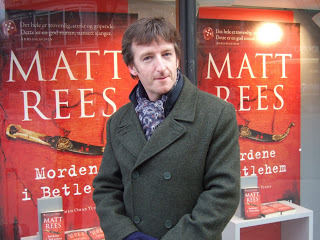
It’s a glamorous life being an international author. For example, I got to go to Norway in the dead of winter when there was two feet of snow in the streets.
And I loved it.
You see, when your home is in the Middle East, experiencing some Arctic conditions are rather welcome. The Norwegians are a lovely people for whom books are a genuinely collective experience across society. And the reindeer meat is really good.
My second novel A Grave in Gaza appeared in Norwegian translation last month and my publisher Forlaget Press flew me to Oslo to do some interviews with local journalists. They timed the publication for a little before Easter, when all Norwegians traditionally buy a pile of crime novels and take them to their remote cabins in the forest for the holiday. Just to be sure that they’re isolated and feeling creeped out….
It’s my second publicity tour in Norway and I must say that the Israelis and Palestinians who reviled the Oslo Peace Process really blew it. Those Norwegians know what they’re about. Everything runs well. Everyone’s polite and interested. They laugh easily. They aren’t hypercritical.
It makes you wonder how they got involved with the prickly types who inhabit the Middle East in the first place.
I met Thomas Mala, my exuberant main man at Press, at Oslo’s central station. He walked me along the relaxed pedestrian street leading past the Parliament and the National Theater up to the Royal Palace. At the bookshop on the corner opposite the theater, he showed me a little surprise: a window filled with my books and two enlarged copies of the cover. I’m not the most egotistical man in the world, but this felt good.
In the lovely Continental Hotel the next morning, I met up with Thor Arvid, a good-natured and quietly intellectual fellow from Press, who introduced me to the journalists I’d be meeting. Not that the first one needed introduction. Last year I’d met Fredrik Wandrup, culture correspondent at Dagbladet, the country’s main newspaper. A new father, he exuded contentment. The previous night he’d been to see Bob Dylan perform in Oslo. “It takes a while to figure out which song he’s playing,” Fredrik said. “But I liked it.”
Next up was a very sympathetic reporter from Klassekampen, which means “class struggle.” Its circulation is rising due to disgust with the bankers who flushed the world economy down the toilet. It also has a reputation for a hard line on the Palestinians. Still, even though my books don’t blame everything on the Israelis, Guri Kulaas understood my aim – to put a human face on the Palestinians, who’re so often seen only as stereotypes -- and she wrote a warm article.
Of course one of the pleasures of traveling to promote my books is meeting the people who publish them. Håkon Harket is the chief of Press in Oslo and a more cultured, thoughtful fellow I can’t imagine. He was generous enough to take me out to the Munch Museum in an Oslo suburb.
Munch is one of my favorite artists. Last year I visited the National Gallery in the center of Oslo, where some of his great works are kept, including Madonna (the most astonishing work of art) and The Scream. There’s more than one Scream, but the one at the National Gallery is better than the version at the Munch Museum.
Håkon walked me through an exhibit of Munch sketches for a series called Alfa and Omega. He was able to place these marvelous works of art in fascinating context from the Danish philosopher Kierkegaard through the plays of Henrik Ibsen.
Alfa and Omega, in Munch’s telling, seemed personifications of Adam and Eve, though somehow even more doomed. He drew the series with elements of expressionism and of the ancient Nordic myths.
He failed to mention brown cheese, however. As a Norwegian he really ought to have done. It’s almost as important to Norway as Odin and Freya and Thor ever were.
So when I was asked what I’d like in return for speaking at the Norwegian Publishers Association about my experience working with publishers around the world, naturally I said: brown cheese.
My speech went down well (although when I made a joke about wearing a Viking helmet with two horns, a gentleman in the audience protested that the real Vikings didn’t wear such helmets: “The Vikings weren’t horny,” he said.). They gave me a kilo of brown cheese, which looks and tastes like caramel chocolate, although its aftertaste is like a cheddar. They also gave me an existential novel by Dag Solstad, which I hadn’t asked for. (They’re publishers, after all.) I’m looking forward to reading it.
The speech was at the Litteraturhuset (Literature House), a central venue for book events and a gathering place for Norwegian publishers. Also home to the best reindeer meat, courtesy of chef Tore Namstad. It’s a very succulent meat with a liver aftertaste. If you’re shocked that I ate an innocent reindeer: next time I’m in Norway, I plan to eat whale.
I went out to Håkon’s place in a beautiful Oslo suburb called Jar for dinner on another night. The snow there was four feet deep, which made me feel that I’d got off lightly with the blizzard that had dumped itself on me downtown that morning. We ate with Håkon’s old friend Henning Kramer Dahl, a fascinating poet and translator who has introduced some major modern writers to Norwegian.
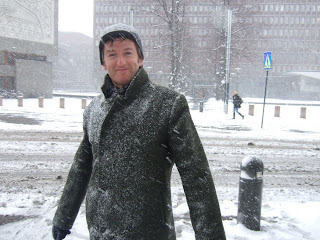
Along the edge of the Royal park from my hotel is the Ibsen Museum. The great playwright returned to Oslo for the last 11 years of his life. You can see the desk where he wrote every morning, which – for a writer and a lover of Ibsen’s plays like me, at least – has an almost mystical fascination.
Ibsen fact: he was five-feet-three. At the Museum you can see his extremely tall top hat and his high-heeled shoes. Clearly little Henrik had a complex. I took it as a reminder that a writer can have all the success in the world, but happiness has to do with accepting oneself.
Two other people I met in Norway about whom I’ll be writing more soon:
Scott Pack. The most innovative man in publishing? I think so. He’s the editor in chief of The Friday Project, part of Harper Collins. Among other ideas he’s been scanning the blogosphere for blogs to turn into books. With Tama Janowitz’s latest, he issued a limited signed printing of 1,000 copies, the buyers of which can send off for a free weird doll photo from Tama’s collection.
Monica Kristensen. After 30 years of polar exploration, she’s eaten polar bears and eaten her dog teams. She’s confronted a macho world. She’s earned a Ph.d in glaciology from Cambridge. Now she’s written a series of crime novels, though they're not yet in English (UK and US publishers, take heed). More on her to come.
This is the life, Part 3: Denmark
Where better to send a bunch of crime writers and their fans than a prison? The Horsens Crime Festival in Jutland, the part of Denmark linked to mainland Europe, did just that last month.
Horsens prison was in use until three years ago. By the end it was a fairly humane place – this is Denmark, after all. But the museum set up in its old cells demonstrates how rough it was back in the mid-1800s. There are various implements for punishment, including a table with leather restraints for the waist, wrists and ankles. Walking through the upper galleries on my own, I looked out of the window and watched a car drive by beyond the walls. I felt a sudden pang of such desolating loneliness that I hurried down to the yard, where the crime festival was being held just to be among people.
(Not before I checked out the display of confiscated pornography from different eras and a rather horrifying pair of brown leather mittens to be locked onto the hands of inveterate Onanists.)
Almost all the authors were Scandinavian, which means that many of them were familiar names, as that sub-genre appears to go from strength to strength. (Swede Camilla Läckberg, however, wasn’t there, which was a shame because I’ve been wanting to meet her ever since I saw the picture of her taking a bubble bath on her website – you think I’m kidding? I bet it gets a lot of traffic.) Organized by the Horsens Library, the only other non-Nordic writer was Don Winslow. One to watch, from what I saw was a smooth and rather dapper Swedish writer named Mons Kallentoft.
My Danish publisher Gyldendal brought me to the festival, where I was interviewed by Niels Lillelund, culture correspondent with Jyllands-Posten. That’s certainly the most famous Danish newspaper where I live. You may remember it’s the paper which published the famous cartoons of Muhammad, which sent millions of Muslims into a rage. Niels, I hasten to add, didn’t draw the cartoons, but he did do a fine job of interviewing me at the book festival about my second Palestinian crime novel A Grave in Gaza, which is just out now in Danish.
Horsens is a quiet provincial town with a charming central section where the croci were just in bloom in the lush grass of the city park. We were there long enough for my editor Helle Stavnem to translate the names of some Danish pastries (one which has a large blob of yellow curd at the center is called “the baker’s bad eye.” Yum.)
The visit to Horsens was over quickly, however, and we were off to Copenhagen, where I stayed right beside the University library, around the corner from Tycho Brahe’s observatory. (There are various theories about Brahe’s possible murder by rival astronomer Johannes Kepler, which I was discussing only today with Tel Aviv University optical historian Raz Chen….)
The palace complex in Copenhagen is quite beautiful, particularly in the early morning fog that comes in off the sea smelling of lentil soup. The Royal Library was my favorite building, or more precisely the wide courtyard leading to it, grassy and empty but for a woman smoking a cigarette on a bench and a gardener pruning bushes. The lights from the red brick building were inviting in the overcast day and made me hanker for my university days.
Outside the palace, on the wall of the canal, a warning to boats: “Proceed with caution. Sculpture under water. Merman with seven sons.” Below the freezing water, eight figures, a man and seven boys. Eerily their heads were oxidized turquoise so that they stood out from their bodies. They seemed to be grasping for the surface.
Another highlight: the Frue Kirke, the cathedral of “Kooben-hawn” (as they call it). Very Spartan design and quite striking.
I dropped by my local agent, Eva Haagerup, at Leonhardt & Hoier. The office is in a neighborhood of central Copenhagen called Pisserenden, because – there’s no nice way to put this – it used to be a low-rent area where people would piss in the streets. Now it’s rather nice with a lot of bars and restaurants, but Eva says that at night there’s still some outdoor watersports.
On the way to the airport, I stopped at the national tv channel for an interview with an energetic, intelligent journalist named Adam Holm. Why can’t US tv people be like this? They’re all so blow-dried and empty. Adam and I arranged to meet in Jerusalem some time.
I picked up a couple of books: one by a Dane whose previous books I’ve enjoyed, Peter Hoeg (“The Quiet Girl”), and another a historical novel about Copenhagen by a Swede (“The Royal Physician's Visit”). I’ll blog about them soon.
Horsens prison was in use until three years ago. By the end it was a fairly humane place – this is Denmark, after all. But the museum set up in its old cells demonstrates how rough it was back in the mid-1800s. There are various implements for punishment, including a table with leather restraints for the waist, wrists and ankles. Walking through the upper galleries on my own, I looked out of the window and watched a car drive by beyond the walls. I felt a sudden pang of such desolating loneliness that I hurried down to the yard, where the crime festival was being held just to be among people.
(Not before I checked out the display of confiscated pornography from different eras and a rather horrifying pair of brown leather mittens to be locked onto the hands of inveterate Onanists.)
Almost all the authors were Scandinavian, which means that many of them were familiar names, as that sub-genre appears to go from strength to strength. (Swede Camilla Läckberg, however, wasn’t there, which was a shame because I’ve been wanting to meet her ever since I saw the picture of her taking a bubble bath on her website – you think I’m kidding? I bet it gets a lot of traffic.) Organized by the Horsens Library, the only other non-Nordic writer was Don Winslow. One to watch, from what I saw was a smooth and rather dapper Swedish writer named Mons Kallentoft.
My Danish publisher Gyldendal brought me to the festival, where I was interviewed by Niels Lillelund, culture correspondent with Jyllands-Posten. That’s certainly the most famous Danish newspaper where I live. You may remember it’s the paper which published the famous cartoons of Muhammad, which sent millions of Muslims into a rage. Niels, I hasten to add, didn’t draw the cartoons, but he did do a fine job of interviewing me at the book festival about my second Palestinian crime novel A Grave in Gaza, which is just out now in Danish.
Horsens is a quiet provincial town with a charming central section where the croci were just in bloom in the lush grass of the city park. We were there long enough for my editor Helle Stavnem to translate the names of some Danish pastries (one which has a large blob of yellow curd at the center is called “the baker’s bad eye.” Yum.)
The visit to Horsens was over quickly, however, and we were off to Copenhagen, where I stayed right beside the University library, around the corner from Tycho Brahe’s observatory. (There are various theories about Brahe’s possible murder by rival astronomer Johannes Kepler, which I was discussing only today with Tel Aviv University optical historian Raz Chen….)
The palace complex in Copenhagen is quite beautiful, particularly in the early morning fog that comes in off the sea smelling of lentil soup. The Royal Library was my favorite building, or more precisely the wide courtyard leading to it, grassy and empty but for a woman smoking a cigarette on a bench and a gardener pruning bushes. The lights from the red brick building were inviting in the overcast day and made me hanker for my university days.
Outside the palace, on the wall of the canal, a warning to boats: “Proceed with caution. Sculpture under water. Merman with seven sons.” Below the freezing water, eight figures, a man and seven boys. Eerily their heads were oxidized turquoise so that they stood out from their bodies. They seemed to be grasping for the surface.
Another highlight: the Frue Kirke, the cathedral of “Kooben-hawn” (as they call it). Very Spartan design and quite striking.
I dropped by my local agent, Eva Haagerup, at Leonhardt & Hoier. The office is in a neighborhood of central Copenhagen called Pisserenden, because – there’s no nice way to put this – it used to be a low-rent area where people would piss in the streets. Now it’s rather nice with a lot of bars and restaurants, but Eva says that at night there’s still some outdoor watersports.
On the way to the airport, I stopped at the national tv channel for an interview with an energetic, intelligent journalist named Adam Holm. Why can’t US tv people be like this? They’re all so blow-dried and empty. Adam and I arranged to meet in Jerusalem some time.
I picked up a couple of books: one by a Dane whose previous books I’ve enjoyed, Peter Hoeg (“The Quiet Girl”), and another a historical novel about Copenhagen by a Swede (“The Royal Physician's Visit”). I’ll blog about them soon.
The Best Bookshop in Germany
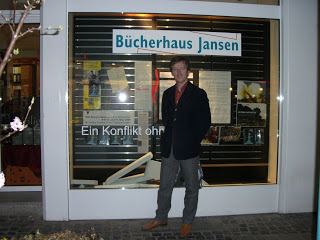
In the town of Ruesselsheim, near Mainz, I've discovered the best bookshop in Germany. The Buecherhaus Jansen stands in a down-at-heel pedestrian street at the heart of an industrial town (home to Opel cars, a troubled subsidiary of General Motors), surrounded mostly by doner kebab restaurants and discount stores. Hans-Juergen Jansen has built his store into a cultural center for the surrounding towns. He has a busy program of visiting authors, mostly German, and other performers for children, on whom his bookshop has a particular focus. His wife Monika also does seminars about books and performance, and his daughter puts on shows for kids (she travels the country with her Slovakian partner performing an adaptation of The Gruffalo.) I've done three readings for Herr Jansen and each time they're full, because of his efficient publicity operation and because customers know that he brings them something they can't get elsewhere in their area. On my recent visit (photo) Herr Jansen and his assistant Sonja had put up a window display about my book A Grave in Gaza which featured smashed cinder blocks a la Gaza. But inside the bookshop everything is orderly and filled with the welcoming scent of new books. Ruesselsheim isn't the most glamorous spot in Germany, but I can't wait to visit again.
The Writing Life: Christopher G. Moore
Readers love to discover an author whose work suggests they’re a kindred spirit. Novelists, engaged in the often lonely work of writing, enjoy it even more. That’s how I feel about Christopher G. Moore, whose path is in many ways similar to mine (as you’ll see in this interview). Based in Bangkok, he’s the creator of one of the most striking sleuths in crime fiction: Vincent Calvino seems a distillation of all the most intriguing expats you’ll ever meet traveling the world and at the same time utterly unique. Moore's “Spirit House” is one of the most riveting crime novels I’ve read, and I’m delighted that he’s the first fiction writer to participate in “The Writing Life” interview series.
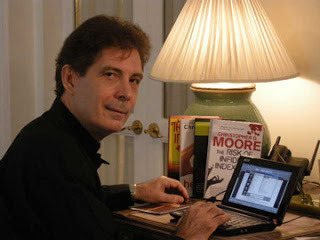
How long did it take you to get published?
My publishing history is a checkered one. My first professional sale was a radio drama to the CBC in 1979, and my first novel (His Lordship’s Arsenal) was published in New York in 1985. After what will soon be 21 novels (The Corruptionist will come out in 2010), I look back and think that I was lucky to start out when I did. It is much tougher now.
Would you recommend any books on writing?
There is a small library full of books on various aspects of writing. Ranging from the mechanics, to the business and legal issues, to self-help. A good web site which includes a page titled Writers Resources which has a lot of useful information about the creative process. Novelist Timothy Hallinan is the brains behind the website. It is hard to disagree with Stephen King’s "On Writing". He says that all writers must be readers. The best education is to read and re-read a diverse range of very good books. I read between 50 to 150 pages a day.
What’s a typical writing day?
The smell of fresh coffee and a long plume of black smoke rising from a burning bus across town. Seriously, there is no “typical” day as any book is a long series of marginally connected events: on the street for research, note making, organizing material, gathering profile information on characters, assembling the cast, selecting an incident that sets off a chain of events much like breaking the rack of ball in pool, fiddling with the outline, working on plot points and structure. Then there is going back to the desk to write the first draft. . .
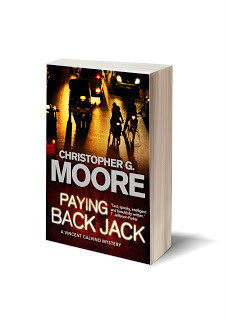
Plug your latest book. What’s it about? Why’s it so great?
Grove Press will release the hardback edition of Paying Back Jack in October 2009 and Atlantic Books will release it in December 2009. This is the 10th novel in the Vincent Calvino crime fiction series.
In Paying Back Jack, Calvino agrees to follow the “minor wife” of a Thai politician and report on her movements. His client is Rick Casey, a shady American whose life has been darkened by the unsolved murder of his idealistic son. But what seems to be a simple surveillance job pulls Calvino into a quest for revenge, as well as a perilous web of political allegiance. Calvino narrowly escapes an attempt on his life and then avoids being framed for a murder only through the calculated lever-pulling of his best friend, Thai police colonel, Pratt. But unknown to our man in Bangkok, in an anonymous apartment tower in the center of the city, a two-man sniper team awaits its shot, a shot that will change everything.
I’ll let a review place Paying Back Jack in the context of contemporary Thai culture. “It's easy to see why Moore's books are popular: While seasoned with a spicy mixture of humor and realism, they stand out as model studies in East-West encounters, as satisfying for their cultural insights as they are for their hard-boiled action.”—Mark Schreiber, The Japan Times
How much of what you do is:
a) formula dictated by the genre within which you write?
I am told there are quite a few rules. But I never bothered to learn what they are. The private eye novel is mainly thought of as the creation of American authors; notably Raymond Chandler and Dashiell Hammett. It is an American invention based on crime in American cities and the social and class structure within which the private eye, police, victims and villains live and die. If there is an American location formula, I broke it in 1992 by setting Spirit House, the first of the Vincent Calvino novels set in a foreign location.
b) formula you developed yourself and stuck with?
To bring the reader into a different culture, different rules, expectations, language, and make it meaningful without overwhelming him/her with obscure references or incidents.
The goal is to make Asia accessible without losing the vitality and history of the place.
c) as close to complete originality as it’s possible to get each time?
I am fortunate to live in a place (Bangkok) and at a time (political chaos) that provides me with more than enough original material. A third of my fan mail is: Are you safe from the gunfire? Originality can’t be separated from the circumstances in which a writer finds himself/herself. Originality starts at home. If you lead an original life, then by the process of living the material unfolds. I suspect living in Jerusalem that you understand that authors who are living on the edge of where history is moving like tectonic plates, you understand the importance of location, and the challenges to authority, oppression, and inequality. Originality is giving a face to these concepts in real life drama played out where the stakes are high.
What’s your favorite sentence in all literature, and why?
“Is execution done on Cawdor?” Duncan, MacBeth, Act 1, Scene 4.
Treason, repentance, pardon and ability to die well all wrapped up nicely. So much of who we are is contained in the exchange between Duncan and Malcolm.
What’s the best descriptive image in all literature?
That’s a tall order to fill. Even within crime fiction there are so many compelling images. The opening of the Quiet American by Graham Greene is a wonderful description of French Colonial police and opium smoking in Saigon. But is it the best descriptive image in all literature? Doubtful. If put against the wall, the firing squad awaiting an order for me to answer or die, I’d opt for the opening of MacBeth. It is hard to beat three witches brewing up a storm when facing rifles.
How much research is involved in each of your books?
Research is the heart of any writing project. Research is part of the job. You push yourself into new situations. Meet new people. Take a different order of risk. You assess as you go along, taking notes, talking to people, strangers, friends, colleagues, locals, foreigners, to get a sense of what people are thinking, suffering, wanting, and scheming to get. Research is also the fun part of the process; you are out from behind a computer and mixing with real people. I am big fan of The Collaborator of Bethlehem: An Omar Yussef Mystery and figure you must have spent a lot of time in the back streets to get the atmosphere right. Novelists should have a journalistic instinct in the field, a poet’s instinct distilling the experience, and a surgeon’s instinct in crafting the words.

Where’d you get the idea for your main character?
Vincent Calvino emerged from my four years of living in New York
City. I spent time as a civilian observer with NYPD. Calvino is half Italian and half Jewish and narrative often draws upon this ethnic background. The Thai characters arose from various people that I’ve known in Thailand and elsewhere in Asia over the last 25 years.
What’s your experience with being translated?
It’s a bit like a heart transplant. You are unconscious when it happens and when you wake up (assuming that you do), you really only have a vague idea what was done. The main thing is someone else’s heart is pumping your blood. That said, I’ve become friends with my German, Japanese, and Italian translators. And from what I can see, they’ve successfully performed the transplant. I have a Hebrew edition coming out this summer. I understand the translator is an excellent surgeon.
Do you live entirely off your writing? How many books did you write before could make a living at it?
I am fortunate to make a living from my writing. It was about a dozen books into the game that I was able to have sufficient revenue to pay the rent and food bills. Remember, though, where I live (at least in the early years) the cost of living was very little. That is an important factor for any writer. You need to find a place that you can exist with little money. That means places like New York, London, and Paris which once provided such opportunities for artists with meager incomes, now require a law partner’s income to pay the rent.
How many books did you write before you were published?
Three. Lost, gone but not mourned.
What’s the strangest thing that happened to you on a book tour?
A Russian Mafia thug showed up at a book reading in Pattaya and asked if he could rent one of my books. Guess he didn’t want to lay out the cash investment for a outright sale. It was a public place. I figured he wouldn’t shoot me if I said no.
What’s your weirdest idea for a book you’ll never get to publish?
A katoey dressed in a Santa Claus outfit on Christmas Eve his small boat washed ashore at Muslim fishing village in Java.

How long did it take you to get published?
My publishing history is a checkered one. My first professional sale was a radio drama to the CBC in 1979, and my first novel (His Lordship’s Arsenal) was published in New York in 1985. After what will soon be 21 novels (The Corruptionist will come out in 2010), I look back and think that I was lucky to start out when I did. It is much tougher now.
Would you recommend any books on writing?
There is a small library full of books on various aspects of writing. Ranging from the mechanics, to the business and legal issues, to self-help. A good web site which includes a page titled Writers Resources which has a lot of useful information about the creative process. Novelist Timothy Hallinan is the brains behind the website. It is hard to disagree with Stephen King’s "On Writing". He says that all writers must be readers. The best education is to read and re-read a diverse range of very good books. I read between 50 to 150 pages a day.
What’s a typical writing day?
The smell of fresh coffee and a long plume of black smoke rising from a burning bus across town. Seriously, there is no “typical” day as any book is a long series of marginally connected events: on the street for research, note making, organizing material, gathering profile information on characters, assembling the cast, selecting an incident that sets off a chain of events much like breaking the rack of ball in pool, fiddling with the outline, working on plot points and structure. Then there is going back to the desk to write the first draft. . .

Plug your latest book. What’s it about? Why’s it so great?
Grove Press will release the hardback edition of Paying Back Jack in October 2009 and Atlantic Books will release it in December 2009. This is the 10th novel in the Vincent Calvino crime fiction series.
In Paying Back Jack, Calvino agrees to follow the “minor wife” of a Thai politician and report on her movements. His client is Rick Casey, a shady American whose life has been darkened by the unsolved murder of his idealistic son. But what seems to be a simple surveillance job pulls Calvino into a quest for revenge, as well as a perilous web of political allegiance. Calvino narrowly escapes an attempt on his life and then avoids being framed for a murder only through the calculated lever-pulling of his best friend, Thai police colonel, Pratt. But unknown to our man in Bangkok, in an anonymous apartment tower in the center of the city, a two-man sniper team awaits its shot, a shot that will change everything.
I’ll let a review place Paying Back Jack in the context of contemporary Thai culture. “It's easy to see why Moore's books are popular: While seasoned with a spicy mixture of humor and realism, they stand out as model studies in East-West encounters, as satisfying for their cultural insights as they are for their hard-boiled action.”—Mark Schreiber, The Japan Times
How much of what you do is:
a) formula dictated by the genre within which you write?
I am told there are quite a few rules. But I never bothered to learn what they are. The private eye novel is mainly thought of as the creation of American authors; notably Raymond Chandler and Dashiell Hammett. It is an American invention based on crime in American cities and the social and class structure within which the private eye, police, victims and villains live and die. If there is an American location formula, I broke it in 1992 by setting Spirit House, the first of the Vincent Calvino novels set in a foreign location.
b) formula you developed yourself and stuck with?
To bring the reader into a different culture, different rules, expectations, language, and make it meaningful without overwhelming him/her with obscure references or incidents.
The goal is to make Asia accessible without losing the vitality and history of the place.
c) as close to complete originality as it’s possible to get each time?
I am fortunate to live in a place (Bangkok) and at a time (political chaos) that provides me with more than enough original material. A third of my fan mail is: Are you safe from the gunfire? Originality can’t be separated from the circumstances in which a writer finds himself/herself. Originality starts at home. If you lead an original life, then by the process of living the material unfolds. I suspect living in Jerusalem that you understand that authors who are living on the edge of where history is moving like tectonic plates, you understand the importance of location, and the challenges to authority, oppression, and inequality. Originality is giving a face to these concepts in real life drama played out where the stakes are high.
What’s your favorite sentence in all literature, and why?
“Is execution done on Cawdor?” Duncan, MacBeth, Act 1, Scene 4.
Treason, repentance, pardon and ability to die well all wrapped up nicely. So much of who we are is contained in the exchange between Duncan and Malcolm.
What’s the best descriptive image in all literature?
That’s a tall order to fill. Even within crime fiction there are so many compelling images. The opening of the Quiet American by Graham Greene is a wonderful description of French Colonial police and opium smoking in Saigon. But is it the best descriptive image in all literature? Doubtful. If put against the wall, the firing squad awaiting an order for me to answer or die, I’d opt for the opening of MacBeth. It is hard to beat three witches brewing up a storm when facing rifles.
How much research is involved in each of your books?
Research is the heart of any writing project. Research is part of the job. You push yourself into new situations. Meet new people. Take a different order of risk. You assess as you go along, taking notes, talking to people, strangers, friends, colleagues, locals, foreigners, to get a sense of what people are thinking, suffering, wanting, and scheming to get. Research is also the fun part of the process; you are out from behind a computer and mixing with real people. I am big fan of The Collaborator of Bethlehem: An Omar Yussef Mystery and figure you must have spent a lot of time in the back streets to get the atmosphere right. Novelists should have a journalistic instinct in the field, a poet’s instinct distilling the experience, and a surgeon’s instinct in crafting the words.

Where’d you get the idea for your main character?
Vincent Calvino emerged from my four years of living in New York
City. I spent time as a civilian observer with NYPD. Calvino is half Italian and half Jewish and narrative often draws upon this ethnic background. The Thai characters arose from various people that I’ve known in Thailand and elsewhere in Asia over the last 25 years.
What’s your experience with being translated?
It’s a bit like a heart transplant. You are unconscious when it happens and when you wake up (assuming that you do), you really only have a vague idea what was done. The main thing is someone else’s heart is pumping your blood. That said, I’ve become friends with my German, Japanese, and Italian translators. And from what I can see, they’ve successfully performed the transplant. I have a Hebrew edition coming out this summer. I understand the translator is an excellent surgeon.
Do you live entirely off your writing? How many books did you write before could make a living at it?
I am fortunate to make a living from my writing. It was about a dozen books into the game that I was able to have sufficient revenue to pay the rent and food bills. Remember, though, where I live (at least in the early years) the cost of living was very little. That is an important factor for any writer. You need to find a place that you can exist with little money. That means places like New York, London, and Paris which once provided such opportunities for artists with meager incomes, now require a law partner’s income to pay the rent.
How many books did you write before you were published?
Three. Lost, gone but not mourned.
What’s the strangest thing that happened to you on a book tour?
A Russian Mafia thug showed up at a book reading in Pattaya and asked if he could rent one of my books. Guess he didn’t want to lay out the cash investment for a outright sale. It was a public place. I figured he wouldn’t shoot me if I said no.
What’s your weirdest idea for a book you’ll never get to publish?
A katoey dressed in a Santa Claus outfit on Christmas Eve his small boat washed ashore at Muslim fishing village in Java.
Lecture en francais a Jerusalem
Je fais une lecture en francais chez la librairie francaise a Jerusalem ce mois. Voici les detailles :
«Meurtre chez les Samaritains» de Matt Rees, Editions Albin Michel
Tout est possible en Palestine, et rien ne dit que le jeune Ishaq, le fils du prêtre des Samaritains de Naplouse, n’a pas été exécuté parce qu’il était homosexuel. Rien ne dit non plus que sa connaissance intime des caisses noires du Vieux, l’ancien Président de l’Autorité palestinienne, ne lui a pas été fatale. Après Le Collaborateur de Bethléem (qui vient de sortir en poche) et Une tombe à Gaza, qui ont installé Matt Rees comme l’un des maîtres du polar, cette troisième enquête d’Omar Youssef quadrille le labyrinthe de la casbah de l’antique cité de Cisjordanie et explore les arcanes de l’univers des Samaritains.
"Omar Youssef est le Marlowe de la rue arabe." NewYork Magazine
Matt REES sera à la librairie et signera ses livres le dimanche 28 Juin à 18h30
Librairie Vice-Versa
par téléphone: 02-6244412
par fax: 02-6244112
par mail: lib@viceversalib.com – Notre site: viceversalib.com
«Meurtre chez les Samaritains» de Matt Rees, Editions Albin Michel
Tout est possible en Palestine, et rien ne dit que le jeune Ishaq, le fils du prêtre des Samaritains de Naplouse, n’a pas été exécuté parce qu’il était homosexuel. Rien ne dit non plus que sa connaissance intime des caisses noires du Vieux, l’ancien Président de l’Autorité palestinienne, ne lui a pas été fatale. Après Le Collaborateur de Bethléem (qui vient de sortir en poche) et Une tombe à Gaza, qui ont installé Matt Rees comme l’un des maîtres du polar, cette troisième enquête d’Omar Youssef quadrille le labyrinthe de la casbah de l’antique cité de Cisjordanie et explore les arcanes de l’univers des Samaritains.
"Omar Youssef est le Marlowe de la rue arabe." NewYork Magazine
Matt REES sera à la librairie et signera ses livres le dimanche 28 Juin à 18h30
Librairie Vice-Versa
par téléphone: 02-6244412
par fax: 02-6244112
par mail: lib@viceversalib.com – Notre site: viceversalib.com
Published on June 18, 2009 00:42
•
Tags:
appearances, book, crime, fiction, france, israel, jerusalem, samaritan-s, secret, tour
Hot Reading in East Jerusalem!
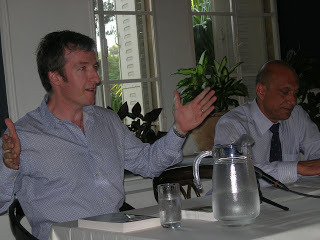
This weekend I was the guest of Munther Fahmi, who runs the excellent bookshop at the American Colony Hotel in East Jerusalem, for a reading from my newest Palestinian crime novel THE SAMARITAN'S SECRET. Munther and I have been scheming for some time to organize an event, so it was great to finally get it together.
I knew it'd be an interesting crowd at the Colony, which manages to be something like neutral ground (although many Israelis might dispute that) in Jerusalem. There were foreign journalists and diplomats, Israelis and Palestinians among the sizeable crowd, including some old friends I haven't seen for some time. Oh, and tourists, too -- a rare species since the intifada, but I signed for visitors from Berlin and Seattle, Ireland and Serbia.
I was also delighted that one of the people on whom I based the character of a World Bank worker in THE SAMARITAN'S SECRET happened to be staying at the Colony this weekend. I was able to give him the news that I'd turned him into a woman and changed his employer. He seemed pleased with both alterations, and I hope he enjoys the book.
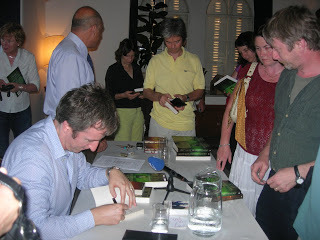
I've edited the photos so that you can't see how hot it became in the room. By the time I was signing the books at the end I was rather inelegantly dripping with sweat. The alternative, of course, was the honking of passing Arab wedding convoys and, as antiglobalization activist Naomi Klein discovered when the windows were opened to let in some air for her reading immediately after mine, the evening call to prayers by the muezzin at the mosque next door. (It's the Mosque of Sheikh Jarrah, named after Saladin's doctor, whose tomb it houses.)
To get on Munther's mailing list for future readings at his excellent bookshop, write to him at bookshopat@gmail.com.
Published on June 28, 2009 03:05
•
Tags:
appearances, book, doctine, globalization, ireland, islam, israel, jerusalem, klein, naomi, nonfiction, omar, palestine, palestinians, samaritan-s, samaritans, secret, shock, tour, yussef
Ingenious book readings: Just don't mention books!
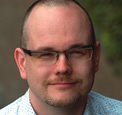
In his terrific book "On Writing" Stephen King notes that he once asked Amy Tan what she's NEVER asked about at public readings. "They never ask about the writing," Tan tells him. Which spurs King to write a book about exactly that.
Now controversial UK publishing guru Scott Pack goes one better. Public appearances by writers. With no readings. And no questions about...books.
The idea, as Scott explains here, is to get writers talking about their life and interests outside their books. Ultimately of course I think that'll take them back to their books. But it's a great way to refresh the rather tired world of literary events. For more on Scott's plan, look at his blog.
Published on July 12, 2009 01:13
•
Tags:
blogs, book, fiction, king, literature, publishing, readings, stephen, tour
Omar Yussef for President of Palestine!
My latest post on the International Crime Authors Reality Check blog:
Unlike the Palestinians (who don’t have one), Palestinian politics is in a real state. A civil war that’s been bubbling and sometimes burning for two years plus. No government in Gaza because Hamas, which rules there, is isolated. Accusations by a top PLO official that current Palestinian President Mahmoud Abbas had his predecessor Yasser Arafat poisoned.
But don’t worry, Palestine. I have the solution, insh’allah. I propose a plan to end the violence and bring Palestine out of its international isolation. I propose that my fictional Palestinian sleuth Omar Yussef stand for election as president.
There are supposed to be elections next year. Abbas, whose term is already up, has refused to step down because he says the parliament approved an extra year due to the civil war emergency. Hamas responds that it controls the parliament, which hasn’t been able to sit because of the civil war.
The two sides, Hamas and Abbas’s Fatah, are due to meet this weekend in Cairo to discuss a truce. Don’t hold your breath. Fatah’s long-awaited Congress is set for early August in Bethlehem and no one will go out on a limb before that – young reformers want to get rid of Arafat’s corrupt old hacks, and no one wants to go into that vulnerable to criticism for being soft on Hamas.
So here’s my pitch for Omar Yussef.
Unlike Fatah, Omar is not associated with massive financial corruption. Neither is he, like Hamas Prime Minister Ismail Haniya, drawing close to Iran for financial backing, in the face of an international boycott. Omar is a decent, honorable Palestinian who stands against the corruption and violence that engulfs the Palestinians.
On book tours, people often ask me if Omar and his stance accord with the views of real Palestinians. I say, yes, that’s exactly what most Palestinians want. They don’t have a political alternative to Hamas and Fatah because both groups are armed and backed by big international donors – and prepared to squash any opponents.
But you can’t kill a fictional detective, which means Omar is able to stand up to the gunmen who bully other Palestinian politicians into silence.
It’s not certain that the elections will take place, unfortunately. Either Hamas will succeed in stopping them, or Abbas will realize that he’d lose to Haniya and cancel them at the last minute (Arafat called presidential elections more or less every time anyone annoyed him, but somehow he almost never got around to holding them.) Who better than a fictional character to run in an election that’ll never take place for the job of president of a country which doesn’t yet exist (and looks further away from statehood every day)?
If they step aside for Omar Yussef, Abbas and Haniya could get down to the real business they seem so keen to sidestep: an agenda for peace within the Palestinian factions and true negotiations with Israel for an end to the conflict.
Or is that just fiction, too?
Stay tuned for more on Omar’s candidacy.
Note for a future blog: try to find the office in Ramallah where Presidential candidacies can be registered.
Second note to self: Remember to place bets with anyone who’ll take the other side that such a place doesn’t exist or that it’d be closed when I visit.
Unlike the Palestinians (who don’t have one), Palestinian politics is in a real state. A civil war that’s been bubbling and sometimes burning for two years plus. No government in Gaza because Hamas, which rules there, is isolated. Accusations by a top PLO official that current Palestinian President Mahmoud Abbas had his predecessor Yasser Arafat poisoned.
But don’t worry, Palestine. I have the solution, insh’allah. I propose a plan to end the violence and bring Palestine out of its international isolation. I propose that my fictional Palestinian sleuth Omar Yussef stand for election as president.
There are supposed to be elections next year. Abbas, whose term is already up, has refused to step down because he says the parliament approved an extra year due to the civil war emergency. Hamas responds that it controls the parliament, which hasn’t been able to sit because of the civil war.
The two sides, Hamas and Abbas’s Fatah, are due to meet this weekend in Cairo to discuss a truce. Don’t hold your breath. Fatah’s long-awaited Congress is set for early August in Bethlehem and no one will go out on a limb before that – young reformers want to get rid of Arafat’s corrupt old hacks, and no one wants to go into that vulnerable to criticism for being soft on Hamas.
So here’s my pitch for Omar Yussef.
Unlike Fatah, Omar is not associated with massive financial corruption. Neither is he, like Hamas Prime Minister Ismail Haniya, drawing close to Iran for financial backing, in the face of an international boycott. Omar is a decent, honorable Palestinian who stands against the corruption and violence that engulfs the Palestinians.
On book tours, people often ask me if Omar and his stance accord with the views of real Palestinians. I say, yes, that’s exactly what most Palestinians want. They don’t have a political alternative to Hamas and Fatah because both groups are armed and backed by big international donors – and prepared to squash any opponents.
But you can’t kill a fictional detective, which means Omar is able to stand up to the gunmen who bully other Palestinian politicians into silence.
It’s not certain that the elections will take place, unfortunately. Either Hamas will succeed in stopping them, or Abbas will realize that he’d lose to Haniya and cancel them at the last minute (Arafat called presidential elections more or less every time anyone annoyed him, but somehow he almost never got around to holding them.) Who better than a fictional character to run in an election that’ll never take place for the job of president of a country which doesn’t yet exist (and looks further away from statehood every day)?
If they step aside for Omar Yussef, Abbas and Haniya could get down to the real business they seem so keen to sidestep: an agenda for peace within the Palestinian factions and true negotiations with Israel for an end to the conflict.
Or is that just fiction, too?
Stay tuned for more on Omar’s candidacy.
Note for a future blog: try to find the office in Ramallah where Presidential candidacies can be registered.
Second note to self: Remember to place bets with anyone who’ll take the other side that such a place doesn’t exist or that it’d be closed when I visit.
Five smokes and a new novel: Klaus Modick’s Writing Life
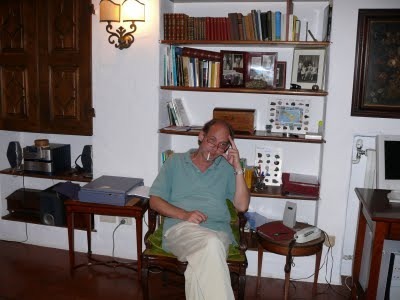
When my second novel A GRAVE IN GAZA was being translated into German, I received an email from my translator. He had a number of penetrating questions about certain phrases I'd used in the book. He also happened to be the only translator who asked me a question about any of my books (and my work is translated in 22 languages so far.) Perhaps it’s not for nothing that Germany is the country where that particular book seems to have had the greatest resonance. It’s also not for nothing that the translator was one of Germany’s most significant literary voices in his own right. I later met Klaus Modick last year in Hamburg, not far from his North German home in Oldenburg. Within 15 minutes, he had smoked five cigarettes and between us we’d come up with the plot for another of my Palestinian detective novels--with a Berlin angle. It's fair to say, we clicked. In return for his plot brainstorming, Klaus asked only that I name a good character “Klaus” and that, as it’ll be a murder mystery, he shouldn’t die too violently. This year in Leipzig Klaus and I chatted over dinner about the German literary landscape. I found it astonishing to hear how rare it is for a German writer to be translated into English. So I’m delighted to give you the insights of this fabulous, sensitive writer, who’s currently summering in that least Germanic of American cities, Los Angeles.
How long did it take you to get published?
My first books were academic literary criticism and thus do not really count. My first novella “Moos” (1984) was rejected by a couple of publishers, but after some months of straying and drifting over editors’ desks it was eventually accepted and became a so called critics’ success, i.e. praises but sales to cry for.
Would you recommend any books on writing?
I don’t think the circulating How-to-write-books-books are helpful. There’s no advice to talent or inspiration. But I did enjoy Stephen King’s “On Writing”, because it is very honest and unpretentious. And I also enjoyed Thomas Mann’s “Novel of a Novel” about the making of his novel “Doktor Faustus”. You can learn from it that ingenuity cannot be learned.
What’s a typical writing day?
Get up at about 8 o’clock, jog through the park, have breakfast, sit on desk, wait for inspiration which is like a cat (doesn’t come when called but only if it wants to), start editing and re-writing yesterday’s shift and use that as a springboard for today’s. Sometimes it works. Have lunch. Have a nap. Afternoons are for research, for reading and correspondances, also for daydreaming about all the great works I haven’t started yet and perhaps never will.
Plug your latest book. What’s it about? Why’s it so great?
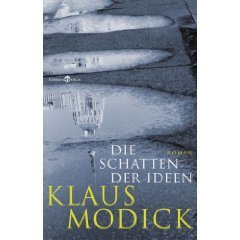
It’s a novel about a German-jewish historian who escapes from the Nazis in 1935, emigrates to the USA, struggles through the miseries of exile, makes finally a career at a New England college - but eventually falls victim to the McCarthy witchhunt in the early 50’s. It’s a book about America, seen through the eyes and experiences of a German there. It’s called “Die Schatten der Ideen” (The Shadows of Ideas). If at all and why it’s great should be decided by the reader - the least I can say about it it’s pretty voluminous.
How much of what you do is:
a) formula dictated by the genre within which you write?
Very little to nothing
b) formula you developed yourself and stuck with?
Pretty much all
c) as close to complete originality as it’s possible to get each time?
I’m trying hard ...
What’s your favorite sentence in all literature, and why?
“This is my favorite book in all the world, though I have never read it.” It’s the first sentence of William Goldman’s “The Princess Bride”. It is still my favorite book in all the world and I’m quite jealous about not having written it myself.
What’s the best descriptive image in all literature?
If one picks “the best” one wrongs at least one hundred others. One candidate among the hundreds could be the golden dollar nailed to the mast of the “Pequod” in Melville’s “Moby Dick”.
How much research is involved in each of your books?
Depends on the subject. For “Schatten der Ideen” it took me about a whole year to get my facts together in order to get the fiction. But I have also written books which needed nearly no research.
Where’d you get the idea for your main character?
I ask myself who I could be if I would not be the one I am.
Do you have a pain from childhood that compels you to write? If not, what does?
Not specifically. But I do think that everybody who writes misses something in life (same for readers). R. L. Stevenson once said that writing means to an adult what playing means to the child. That means that not only pain and suffering compel us to write but also pleasures and fun, not only the lack of something but also affluence. (W. Somerset Maugham thought so, too.)
What’s the best idea for marketing a book you can do yourself?
Give it to a reader who will recommend it to another reader who will recommend it to the next and ever so on. Worldwide.
What’s your experience with being translated?
It’s flattering. And it’s interesting, because one realizes that the book one wrote is more than this one and very book. It has siblings now.
Do you live entirely off your writing? How many books did you write before could make a living at it?
I live entirely from writing, or to be more precise from the royalties. That includes not only my own books, but also translations and writing for the media. But my own books are the core of it all.
What’s the strangest thing that happened to you on a book tour?
Being introduced to the audience as someone else.
What’s your weirdest idea for a book you’ll never get to publish?
Writing the truth.



